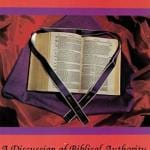And by James White’s “Reasoning,” Jesus Couldn’t be God and was a Blaspheming False Teacher

In a post dated 26 March 2013, entitled, “Talking to Dead People: Tim Staples Refuted,” Reformed Baptist anti-Catholic apologist, Bishop “Dr.” [???] James White noted that Catholic apologist Tim Staples cited a passage from an older book of his: Answers to Catholic Claims (Crowne Publications, 1990). It was cut off in this version (some glitch on White’s blog), but I have the fuller citation since I have the book. White gave it to me in 1995 when we engaged in our lengthy postal debate. Here it is:
The only communication with spirit beings that originates with man that is allowed in Scripture is that of prayer to God and He alone. Prayer, it is asserted, is an act of worship, and we are to worship God only. (p. 126, my italics and bolding)
If it weren’t for White’s qualification in the italicized and bolded portion above, I could answer this with many many examples. But even with the qualification, Scripture (in the words of Jesus Himself) contradicts him in (at the very least) four ways.
The best disproof is in the story (not parable) of the rich man and Lazarus:
Luke 16:24 (RSV) And he called out, ‘Father Abraham, have mercy upon me, and send Laz’arus to dip the end of his finger in water and cool my tongue; for I am in anguish in this flame.’
This is the Abraham of the Bible: long dead by that time, being asked to do something by a “rich man” (16:19, 22), traditionally known as Dives (which is simply a Latin word for “rich man”). His answer was, in effect, “no” (16:25-26). Thus failing in that request, he prays to him again for something else:
Luke 16:27-28 And he said, ‘Then I beg you, father [KJV: “I pray thee therefore, father”], to send him to my father’s house, [28] for I have five brothers, so that he may warn them, lest they also come into this place of torment.’
His request is again declined (16:29). So, like any good self-respecting Jew (Moses even “negotiated” with God), he argues with Abraham (16:30). But Abraham states again that his request is futile (16:31).
The passage also shows (in a fascinating way) that not only can dead saints hear our requests, they also have some measure of power to carry them out on their own. Abraham is asked to “send” a dead man to appear to Dives’ brothers, in order for them to avoid damnation (yet another [potential] instance of dead men — like the prophet Samuel to Saul — communicating to those on the earth). Abraham doesn’t deny that he is able to potentially send Lazarus to do such a thing; he only denies that it would work, or that it is necessary (by the logic of “if they don’t respond to greater factor x, nor will they to lesser factor y”).
Therefore, it is assumed in the story that Abraham could have possibly done so on his own. And this is all told, remember, by our Lord Jesus. It is disputed whether it is a parable or not (several textual factors suggest that it is not; e.g., parables do not use proper names), but even if it is, it nevertheless cannot contain things that are untrue, lest Jesus be guilty of leading people into heresy by means of false illustrations or analogies within His common teaching tool: the parable.
This expressly contradicts White’s statement in the following ways:
1) This is a communication with a spirit being (Abraham after death) originated by a man (Dives). White said that the only such communication sanctioned in the Bible is “to God and He alone.”
2) It’s a prayer and petition to Abraham, not God. According to Bishop White, the Bible teaches that prayer can only be directed towards God.
3) White claims that all prayer is “an act of worship.” Therefore, according to him, Dives is worshiping Abraham: contrary to biblical teaching.
4) This means (in the White erroneous outlook) that Jesus doesn’t understand that “The only communication with spirit beings that originates with man that is allowed in Scripture is that of prayer to God and He alone”: since He told this story of an actual event, and sanctioned it in so doing.
5) Jesus (i.e., in White’s mentality and utilizing his false premises) also doesn’t understand that prayer and petitionary requests can only be directed towards God.
6) Jesus also doesn’t get it that prayer is always worship and that only God should be worshiped, since — following White’s flawed logic — He is teaching here that Abraham was worshiped.
7) It follows that Jesus is not omniscient and is a false teacher (not understanding the nature and limitations of prayer).
8) It also follows that He is a blasphemer and is guilty of idolatry.
9) #4-8 all amounts to a disproof that Jesus is God.
Are there any other biblical indications of “communication with spirit beings that originates with man” directed towards a dead person? Yes:
Acts 9:36-40 Now there was at Joppa a disciple named Tabitha, which means Dorcas. She was full of good works and acts of charity. [37] In those days she fell sick and died; and when they had washed her, they laid her in an upper room. [38] Since Lydda was near Joppa, the disciples, hearing that Peter was there, sent two men to him entreating him, “Please come to us without delay.” [39] So Peter rose and went with them. And when he had come, they took him to the upper room. All the widows stood beside him weeping, and showing tunics and other garments which Dorcas made while she was with them. [40] But Peter put them all outside and knelt down and prayed; then turning to the body he said, “Tabitha, rise.” And she opened her eyes, and when she saw Peter she sat up.
This shows two things (both absolutely anathema to White and most Protestants):
1) St. Peter prayed for the dead (9:40).
2) St. Peter communicated to a dead person (9:40: “Tabitha, rise.”): expressly against what White claims Scripture never allows.
And of course, in this, Peter was only following the lead and example and command of His Lord Jesus, Who said that His disciples would raise the dead, just as He did. And when Jesus raised Lazarus, He, too, talked to a dead man: “Lazarus, come out” (Jn 11:43). And He did so again in the case of the son of the widow of Nain, whom He raised from the dead (Lk 7:11-15): “And he said, ‘Young man, I say to you, arise.'”
Therefore, Jesus is again exposed as a false teacher — giving now three bad examples of false theology and practice — , therefore, not God, etc., etc.
Since that can’t be the case, and since the Bible clearly contradicts White’s position here, we must conclude that he is gravely mistaken, and that the Bible and Jesus strongly affirm Catholic and Orthodox teaching in this regard. It’s always best to go with Jesus and the Bible. If someone like James White contradicts them, don’t listen to him. And if White is this bad of a Bible teacher in this instance, it sure casts doubt on his ability in other areas of his anti-Catholic and anti-biblical exegegis, too, doesn’t it? I can personally attest to this, due to my refutations of dozens of such poor and biblically implausible and self-contradictory arguments from Bishop White, going back to 1995.
***
Related Reading:
*
Praying to Angels & Angelic Intercession [2015]
Asking Saints to Intercede: Teaching of Jesus [2015]
Why Pray to Saints Rather than God? [9-4-15]
Dialogue on Praying to Abraham (Luke 16) [5-22-16]
Prayer to Saints: “New” [?] Biblical Argument [5-23-16]
Why Would Anyone Pray to Saints Rather Than to God? [National Catholic Register, 1-8-17]
Invocation & Intercession of Saints & Angels: Bible Proof [10-22-16 and 1-9-17]
“Armstrong vs. Geisler” #5: Prayer to Creatures [2-20-17]
Dialogue: Rich Man’s Prayer to Abraham (Luke 16) and the Invocation of Saints (vs. Lutheran Pastor Ken Howes) [5-3-17]
Dialogue on Samuel Appearing to Saul (Witch of Endor) [5-6-17]
Dialogue on Prayer to the Saints and Hades / Sheol [12-19-17]
Prayers to Saints & for the Dead: Six Biblical Proofs [6-8-18]
4 Biblical Proofs for Prayers to Saints and for the Dead [National Catholic Register, 6-16-18]
C. S. Lewis & the Invocation & Communion of Saints [10-10-19]
***
***
Photo credit: wilhei (4-13-15) [Pixabay / Pixabay License]
***













